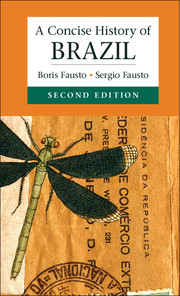Book contents
- Frontmatter
- Dedication
- Contents
- List of Maps
- Preface
- Map
- 1 Colonial Brazil (1500–1822)
- 2 Imperial Brazil (1822–1889)
- 3 The First Republic (1889–1930)
- 4 The Vargas State (1930–1945)
- 5 The Democratic Experiment (1945–1964)
- 6 The Military Government and the Transition to Democracy (1964–1984)
- 7 Modernization under Democracy (1985–2010)*
- Bibliography
- Index
Preface
Published online by Cambridge University Press: 05 August 2014
- Frontmatter
- Dedication
- Contents
- List of Maps
- Preface
- Map
- 1 Colonial Brazil (1500–1822)
- 2 Imperial Brazil (1822–1889)
- 3 The First Republic (1889–1930)
- 4 The Vargas State (1930–1945)
- 5 The Democratic Experiment (1945–1964)
- 6 The Military Government and the Transition to Democracy (1964–1984)
- 7 Modernization under Democracy (1985–2010)*
- Bibliography
- Index
Summary
Writing a synthetic history of Brazil for an English-language readership entails a set of challenges that I feel I must make explicit.
Beginning with the presupposition that there is scant familiarity with Brazilian history in the English-speaking world, I chose to emphasize historical narrative and introduce my readers to a body of knowledge which I consider fundamental. This choice has obvious advantages. Among them, it avoids taking gaps in readers’ knowledge for granted. However, at the same time, to lead readers along a path in a historical narrative is methodologically outdated and could result in a superficial understanding of important events.
I tried to minimize this shortcoming by combining narrative with discussions of central themes in the Brazilian historical process: e.g., the nature of Brazilian slavery, Brazil’s remaining united once it became an independent country, and the characteristics of its recent transition from an authoritarian government to a democratic one.
I have also sought to inform readers about the more significant historiographical controversies when such controversies make way for different interpretations of the past as well as when they demonstrate that history is a body of knowledge subject to constant reappraisal and refinement.
- Type
- Chapter
- Information
- A Concise History of Brazil , pp. xiii - xvPublisher: Cambridge University PressPrint publication year: 2014



